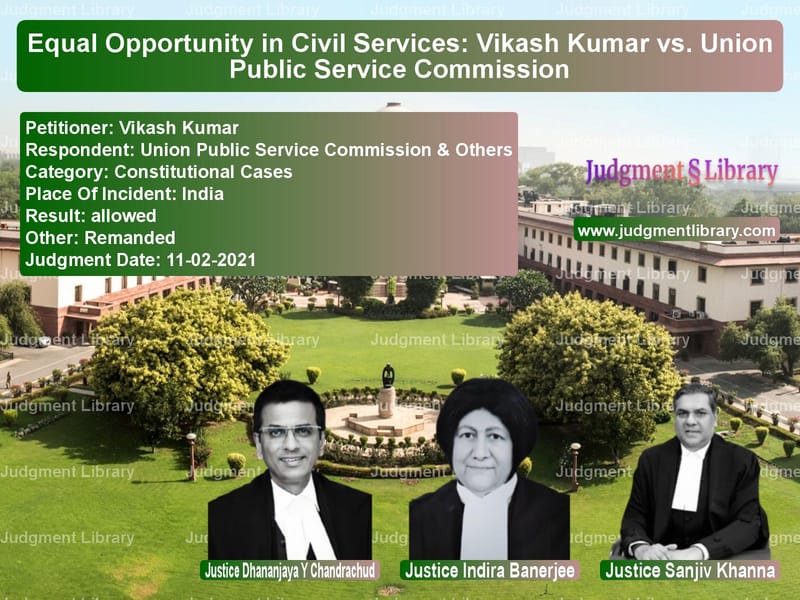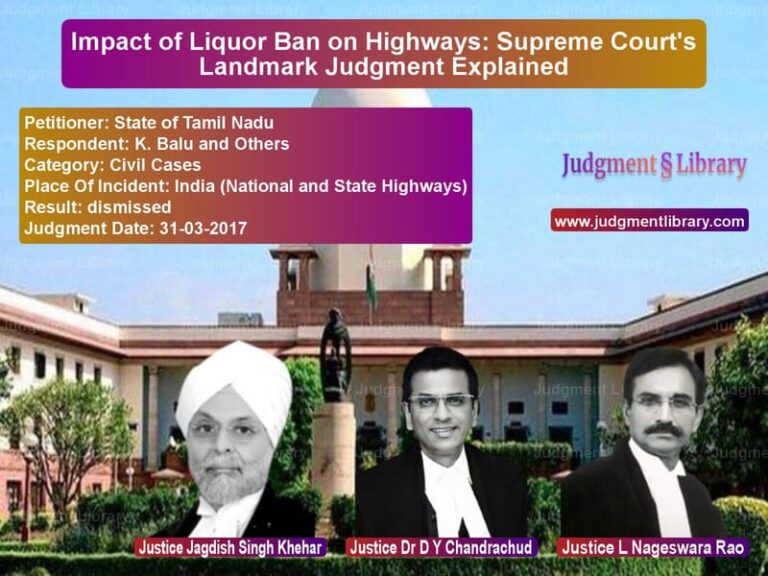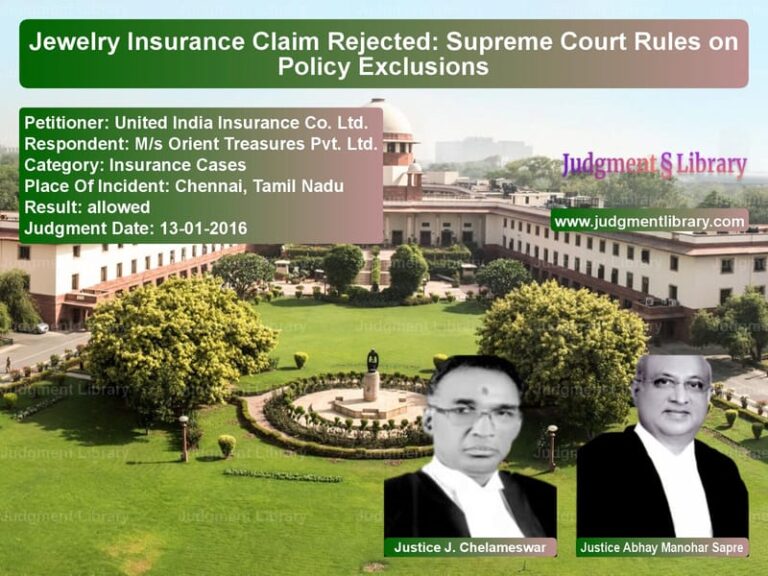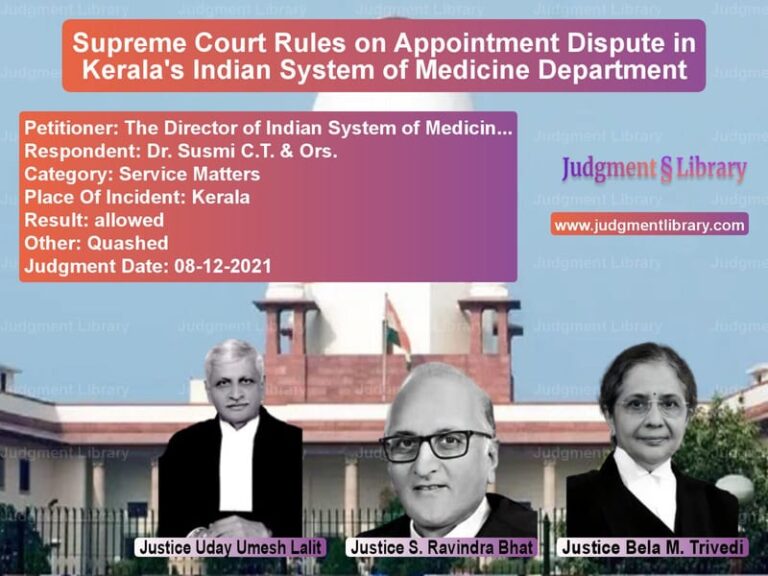Equal Opportunity in Civil Services: Vikash Kumar vs. Union Public Service Commission
The case of Vikash Kumar vs. Union Public Service Commission & Others is a landmark judgment concerning the rights of persons with disabilities in competitive examinations. The Supreme Court examined whether a candidate with a neurological condition was entitled to the assistance of a scribe during the Civil Services Examination (CSE) conducted by the Union Public Service Commission (UPSC). The case not only dealt with an individual grievance but also set a precedent for ensuring equal opportunities for all persons with disabilities.
Background of the Case
Vikash Kumar, an MBBS graduate from Jawaharlal Nehru Institute of Postgraduate Medical Education and Research (JIPMER), suffered from Writer’s Cramp, a neurological condition that severely affected his ability to write. In 2017, he appeared for the Civil Services Examination (CSE) and was provided with a scribe. However, in 2018, his request for a scribe was rejected by the UPSC, citing the Civil Services Examination Rules (CSE Rules 2018), which allowed scribes only for blind candidates and those with locomotor disabilities or cerebral palsy affecting the dominant writing hand with a minimum of 40% impairment.
Vikash Kumar approached the Central Administrative Tribunal (CAT) and later the Delhi High Court, both of which dismissed his plea, stating that he did not meet the benchmark disability criteria of 40% impairment. The matter was then taken to the Supreme Court, which deliberated on the rights of persons with disabilities under the Rights of Persons with Disabilities Act, 2016 (RPwD Act).
Key Legal Issues
- Whether a person with a neurological condition like Writer’s Cramp was entitled to the assistance of a scribe under the RPwD Act.
- Whether the benchmark disability criterion (40% impairment) was a valid precondition for availing reasonable accommodation in competitive exams.
- The obligations of government authorities under the RPwD Act to provide equal opportunities and reasonable accommodations.
- The potential misuse of scribes and how to balance fairness in competitive examinations with the rights of persons with disabilities.
Arguments by Vikash Kumar
- The appellant argued that the RPwD Act distinguished between ‘persons with disabilities’ and ‘persons with benchmark disabilities.’ While the latter required a 40% impairment for specific benefits like reservations, all persons with disabilities were entitled to reasonable accommodation.
- He contended that Writer’s Cramp was a recognized neurological condition that impaired his ability to write effectively, thereby necessitating the use of a scribe.
- He cited medical certificates from reputed institutions, including the National Institute of Mental Health and Neurosciences (NIMHANS), which confirmed his condition.
- He also pointed out that other institutions, such as the Institute of Chartered Accountants of India and Delhi University, provided scribes to candidates with similar disabilities.
- The appellant argued that the denial of a scribe violated his fundamental rights under Articles 14 and 16 of the Constitution, as well as his statutory rights under the RPwD Act.
Arguments by the UPSC and the Union of India
- The UPSC contended that the CSE Rules 2018 allowed scribes only for blind candidates and those with locomotor disabilities affecting the dominant hand with at least 40% impairment.
- They argued that the appellant had falsely declared himself as a person with a benchmark disability in his application form without possessing the required medical certification.
- The Union of India, represented by the Additional Solicitor General, contended that allowing scribes for non-benchmark disabilities could lead to misuse, affecting the integrity of the competitive examination process.
- They also stated that Writer’s Cramp was not explicitly mentioned in the list of specified disabilities under the RPwD Act.
Supreme Court’s Analysis
The Supreme Court provided an in-depth analysis of the RPwD Act, emphasizing that the Act recognized both ‘persons with disabilities’ and ‘persons with benchmark disabilities.’ The Court made several important observations:
- “The concept of benchmark disability under Section 2(r) cannot be conflated with the broader category of persons with disabilities under Section 2(s).”
- “The denial of a scribe to the appellant on the ground that he does not meet the benchmark disability criteria is contrary to the provisions of the RPwD Act.”
- “Reasonable accommodation is a key principle under the Act, which mandates necessary and appropriate modifications to ensure that persons with disabilities can enjoy their rights equally with others.”
- “Competitive examinations must ensure fairness, but not at the cost of excluding deserving candidates with genuine disabilities.”
Final Judgment
The Supreme Court ruled in favor of Vikash Kumar and made the following directions:
- The appellant was entitled to the facility of a scribe for the Civil Services Examination and any other competitive selection process conducted under government authority.
- The Union Government was directed to frame new guidelines ensuring that persons with disabilities who require a scribe are not denied the facility due to an arbitrary benchmark disability criterion.
- The government was asked to consult with medical and disability experts to formulate a fair policy within three months.
- The guidelines were to be made flexible enough to accommodate different disabilities on a case-by-case basis.
Conclusion
The Supreme Court’s decision in Vikash Kumar vs. UPSC marks a significant step towards ensuring equal opportunities for persons with disabilities. It clarifies that reasonable accommodations like scribes should not be denied based on rigid and arbitrary criteria. The judgment serves as a reminder that disability rights are not privileges but legally enforceable entitlements aimed at fostering an inclusive and just society.
Petitioner Name: Vikash Kumar.Respondent Name: Union Public Service Commission & Others.Judgment By: Justice Dhananjaya Y Chandrachud, Justice Indira Banerjee, Justice Sanjiv Khanna.Place Of Incident: India.Judgment Date: 11-02-2021.
Don’t miss out on the full details! Download the complete judgment in PDF format below and gain valuable insights instantly!
Download Judgment: vikash-kumar-vs-union-public-service-supreme-court-of-india-judgment-dated-11-02-2021.pdf
Directly Download Judgment: Directly download this Judgment
See all petitions in Fundamental Rights
See all petitions in Public Interest Litigation
See all petitions in Education Related Cases
See all petitions in Judgment by Dhananjaya Y Chandrachud
See all petitions in Judgment by Indira Banerjee
See all petitions in Judgment by Sanjiv Khanna
See all petitions in allowed
See all petitions in Remanded
See all petitions in supreme court of India judgments February 2021
See all petitions in 2021 judgments
See all posts in Constitutional Cases Category
See all allowed petitions in Constitutional Cases Category
See all Dismissed petitions in Constitutional Cases Category
See all partially allowed petitions in Constitutional Cases Category







